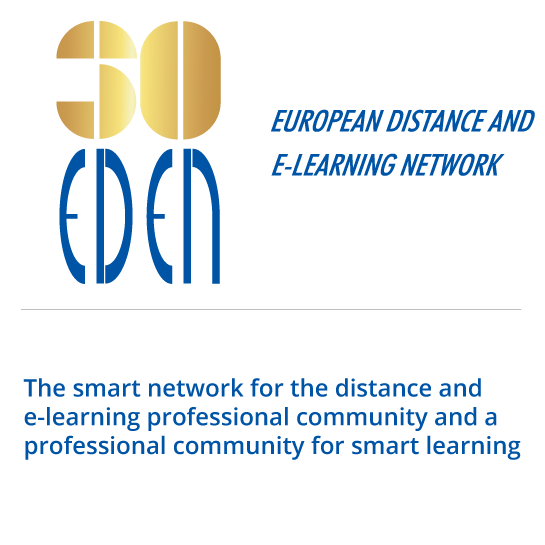7 April 2021, 17:00 CEST
EDEN NAP webinar
Description
In this interactive webinar for EDEN, we will share lived experiences of how four organisations in six countries are using learning analytics on a daily basis. Some of these organisations have implemented learning analytics at an institutional scale, while others have created more specific and bespoke applications and practices. At least two of these organisations provide rich learning analytics data directly to students, while all four also provide rich and aggregate data to educators. For example, at Nottingham Trent University students can easily access their own data about how engaged they are with their studies. At Maastricht University in one course students are given their own data about their learning dispositions and engagement data, which they use for learning statistics and afterwards use to reflect on their practice. In other institutions like the Open University over 3000 teachers are given weekly data about their students via interactive dashboards, and whether (or not) the predictive learning analytics system predicts whether a student will pass the next assignment. At Mountain Heights Academy, an online high school in the US, teachers are using an Action Dashboard (or data-driven to-do list) to spend more time reaching out to their students rather than clicking through disparate systems to find the data they need to intervene with struggling students. In this webinar we specifically will focus on the role of the educator, and how you could use learning analytics in your own classroom. Each of the five speakers will provide practical examples of their practice, and you will be able to work with real-examples of how to consider applying learning analytics.
Type of session: presentations with discussion
Moderator
 Igor Balaban
Igor Balaban
EDEN NAP SC member
Associate Professor at FOI, Vice-dean for science, international cooperation and projects, and Head of Laboratory for advanced technologies in e-learning, University of Zagreb, Croatia
Igor Balaban is Associate Professor at FOI, Vice-dean for science, international cooperation and projects, and Head of Laboratory for advanced technologies in e-learning. He was actively involved in a dozen of European and national projects, and coordinated several of them. He authored and co-authored 50+ scientific and professional papers and cooperates with European Commissions’ Joint Research Centre as an external expert for DigCompOrg & DigCompEdu frameworks and SELFIE tool. He organized and conducted dozens of workshops, talked at more than 20 conferences, and was invited speaker at some of them. He is also a reviewer for several highly respected journals such as Computers & Education, International Journal of ePortfolio and International Journal of Information Systems. His main field of interest is technology supported learning with special focus on adaptivity and personalization in learning environments and digital transformation of educational organizations. He also has a traceable scientific record in assessing the successful implementation of information systems.
Panelists
 Prof Bart Rienties
Prof Bart Rienties
Open University UK
Dr. Bart Rienties is Professor of Learning Analytics and programme lead of the learning analytics and learning design research programme at the Institute of Educational Technology at the Open University UK. He leads a group of academics who provide university-wide learning analytics and learning design solutions and conduct evidence-based research of how students and professionals learn. As educational psychologist, he conducts multi-disciplinary research on work-based and collaborative learning environments and focuses on the role of social interaction in learning, which is published in leading academic journals and books. His primary research interests are focussed on Learning Analytics, Professional Development, and the role of motivation in learning.
 Anna Gillespie
Anna Gillespie
Open University UK
Anna Gillespie is an Associate Lecturer at the OU teaching health and social care subjects. She is also conducting research into understanding how teachers working in distance education can use LA to support student success: What are the barriers preventing teachers from using LA and how do we address these?
 Ed Foster
Ed Foster
Nottingham Trent University
Ed Foster is the Head of Student Engagement & Analytics at Nottingham Trent University (NTU). His team implements learning analytics throughout the University making data available for students, tutors and professional support staff. He directs research activities to improving the use of learning analytics to support students at risk of early departure and currently leads the Onwards from Learning Analytics (OfLA) Erasmus+ project (2018-2021). Ed blogs (badly) at www.LivingLearningAnalytics.blog. Ed will look at the way NTU used learning analytics to coordinate a communications campaign to support students during the coronavirus pandemic.
 Dr Dirk Tempelaar
Dr Dirk Tempelaar
Maastricht University
Dirk Tempelaar is an associate professor at the Maastricht University School of Business and Economics. His main task is the teaching of introductory mathematics and statistics to large sections of first-year students. That teaching applies blended learning following the flipped-class philosophy, where LA serves the function of supporting students to self-regulate the learning in the e-tutorials. Our LA takes into account both log data from e-tutorials as well as survey data of learning dispositions, enabling richer learning feedback.
 Dr. Robert Bodily
Dr. Robert Bodily
Zappee, LLC
Dr. Robert Bodily received his PhD in educational technology from Brigham Young University. His research focuses on improving teaching and learning using learning analytics data and methods. He specifically focuses on teacher-facing and student-facing learning analytics dashboards, and is currently working on an Action Dashboard to help teachers reach out more effectively to struggling students. He works as a Senior Data Scientist and Researcher, bringing expertise from the data side and the research side to make his learning analytics tools more effective.


